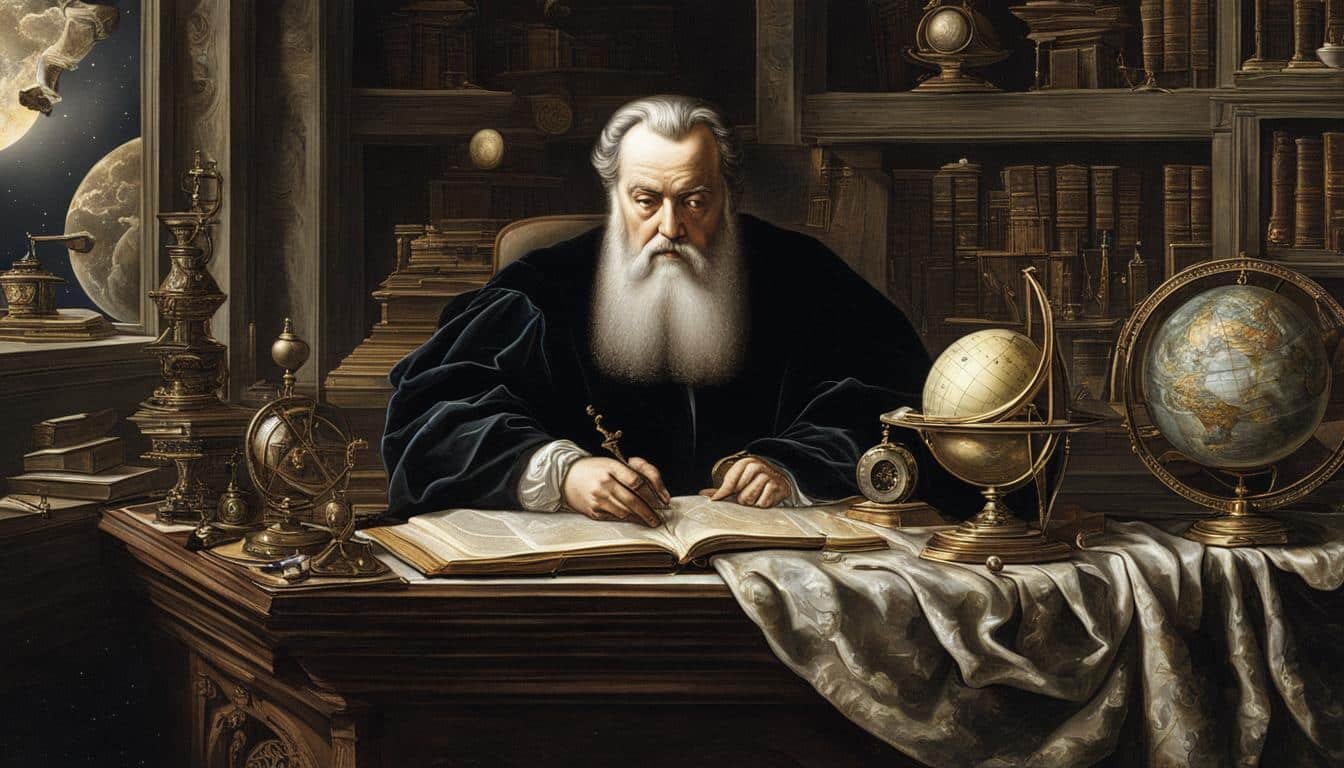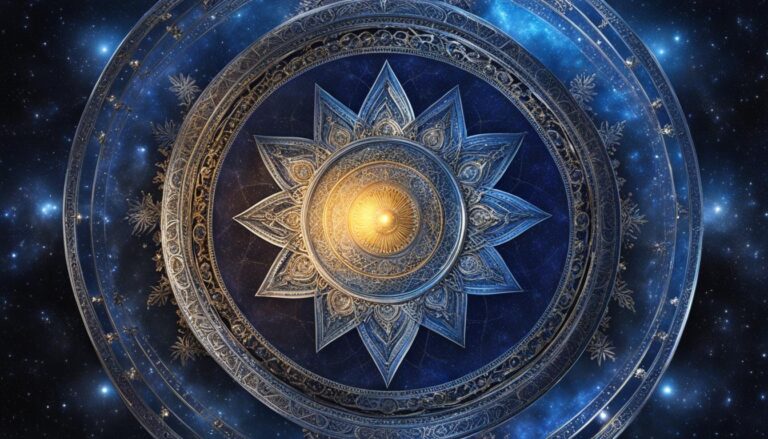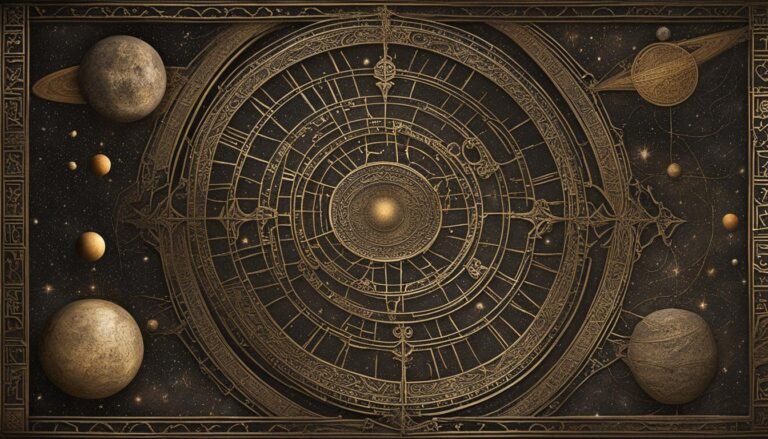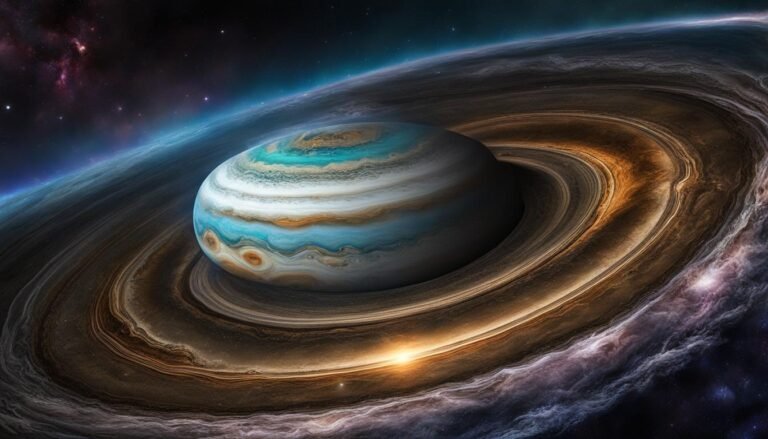Scientists Who Believe in Astrology: A Glimpse into the Cosmic Curiosity of Intellectual Giants
Imagine a world where the boundaries between hard science and the mystic allure of the stars aren’t so distinct. That’s exactly how some of the most eminent minds of the scientific realm have viewed the cosmos, integrating astrological beliefs in science into their work. It’s intriguing to consider that astrology acceptance among scientists isn’t a novel concept; rather, it traces back to the very architects of modern science.
Although today’s scientific community may often regard astrology with skepticism, the history tells us a different story. Renowned astrologers in the scientific field such as Galileo and Kepler were once stewards of celestial influence, marrying astrology and scientific thinking with ease. Your understanding of the universe may very well expand when you learn that the pursuit of knowledge once danced with the stars.
Key Takeaways
- Astrological practices were widely embraced by historic scientific figures.
- Celestial observations once went hand in hand with personal astrological charts.
- Notable scientists integrated astrological beliefs into their revolutionary work.
- The blurred lines between science and astrology reflect a more holistic quest for knowledge in the past.
- Astrophysics pioneers like Galileo and Kepler found validity in the positions of the stars influencing earthly events.
- Understanding the historical context of astrology in science can enrich the appreciation for both fields.
The Historical Genius of Astrology: From Galileo to Kepler
As you delve into the history of astrology’s intersection with groundbreaking scientific thought, it’s impossible to overlook the monumental figures who not only advanced human knowledge of the cosmos but also practiced astrology. These intellectual titans, whose work contributed to the transformation of European astronomy, saw no divide between astrology and science, suggesting a once symbiotic relationship between these domains.
Galileo Galilei: Astronomer and Astrologer
Galileo Galilei stands out as a figure who embraced the integration of astrology and scientific research. While he is best known for his advocacy of the heliocentric model, Galileo also saw significant value in astrology. His services were sought after by the elite of his time, and he believed that astrological knowledge was essential for medical students, teaching them the intricate art of deciphering celestial influence on human health. In his universe, the stars served as a guide not only for understanding the physical cosmos but also for navigating the course of human lives.
Johannes Kepler: Bridging Celestial Mechanics and Predictive Astrology
Another luminary, Johannes Kepler, further exemplified astrology’s credibility within the scientific community. Keen on comprehending the grand design of the universe, his scientific rigor led to the discovery of planetary motion, yet he remained firm in his astrological consultations. Kepler’s role as an astrological advisor to Emperor Rudolf II was a testament to his belief that the alignments of celestial bodies could foretell earthly events—a notion that contributed significantly to the collective body of astrological knowledge.
Tycho Brahe: A Sorcerer’s Astronomy?
Famous not just for his observatory advancements but also for his affinity with the esoteric, Tycho Brahe was a unique blend of a scientist and a sorcerer. His name became so associated with magic that he lent credibility to a whole calendar of magical days. Brahe openly challenged those who dismissed astrology, and he was resolute in his conviction that the practice unlocked deeper mystical truths that complemented his astronomical findings, reinforcing astrology’s place within the scientific dialogue.
Today, the legacy of these visionaries poses intriguing questions about the nature of astrology in the scientific community and its broader implications on scientific credibility. As you explore their contributions, it becomes evident that the boundaries between science and astrology were once far more blurred than they are in modern discourse.
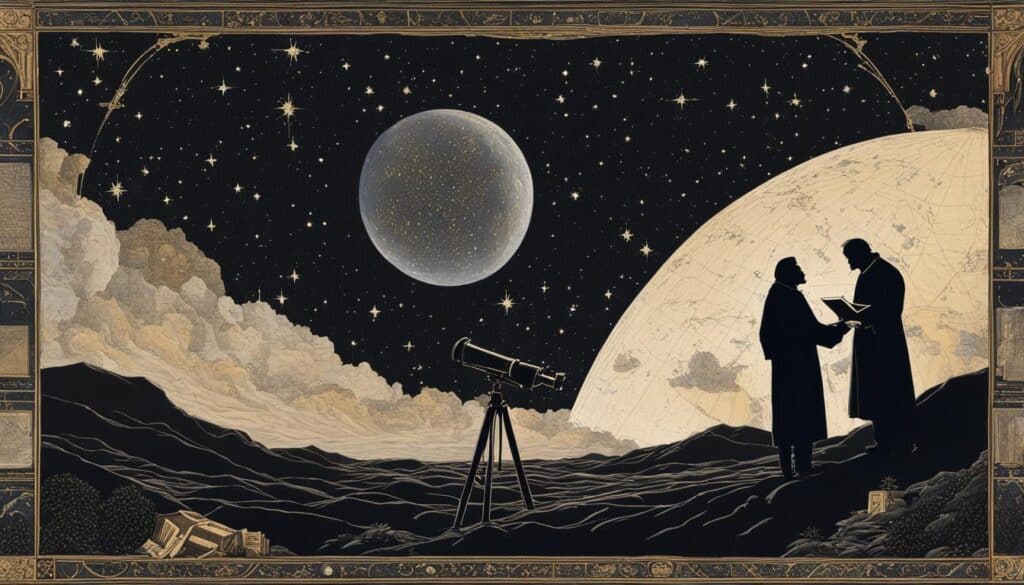
Isaac Newton’s Alchemical Pursuits and Astrological Times
Delve into the life of Isaac Newton, and you’ll find that his scientific genius was not his sole focus. His passion for alchemy and his belief in astrology reveal a fascinating blend of rigorous scientific credibility and mystical pursuits. Newton’s legacy in physics is well-known, yet his alchemical research, often conducted in secrecy, paints a fuller picture of this complex figure.
Newton’s Obsession with Alchemy
Perhaps “obsession” is an apt word to describe Newton’s deep dive into alchemy. Not satisfied with changing the face of classical mechanics, Newton sought out the arcane knowledge that alchemy promised. It is a stark reminder of the intricate and sometimes bewildering relationship between astrology and scientific thinking. So, as you marvel at the forces that govern the motion of planets, remember that the mind which laid down these laws also pondered over the transmutation of metals.
The Philosopher’s Stone and its Alleged Powers
The mythic philosopher’s stone – a substance capable of turning lead into gold – was a pursuit shared by many during Newton’s time, including him. The fabled stone, tied inextricably to the goals of alchemy and astrology, resonated with minds prone to wonder how celestial influences might intertwine with earthly substances. Newton’s quest to uncover nature’s secrets extended beyond gravitational pull, delving into the esoteric with the hope of discovery, revealing a harmonious dance of science and the stars in the intellectual ballet of the era.
- Astrological consultations were not unusual for those engrossed in scientific study; rulers and nobles sought the advice of learned men like Newton.
- The halls of scientific exploration were often lit by the flicker of alchemical experiments, a testament to the period’s intertwining of empirical evidence and celestial divination, number 4 holding as much significance in formulae as in mystical numerology.
As you ponder the laws that govern our universe, it’s intriguing to consider the intriguing duality in the practice and acceptance of astrology and alchemy among history’s greatest scientific minds.
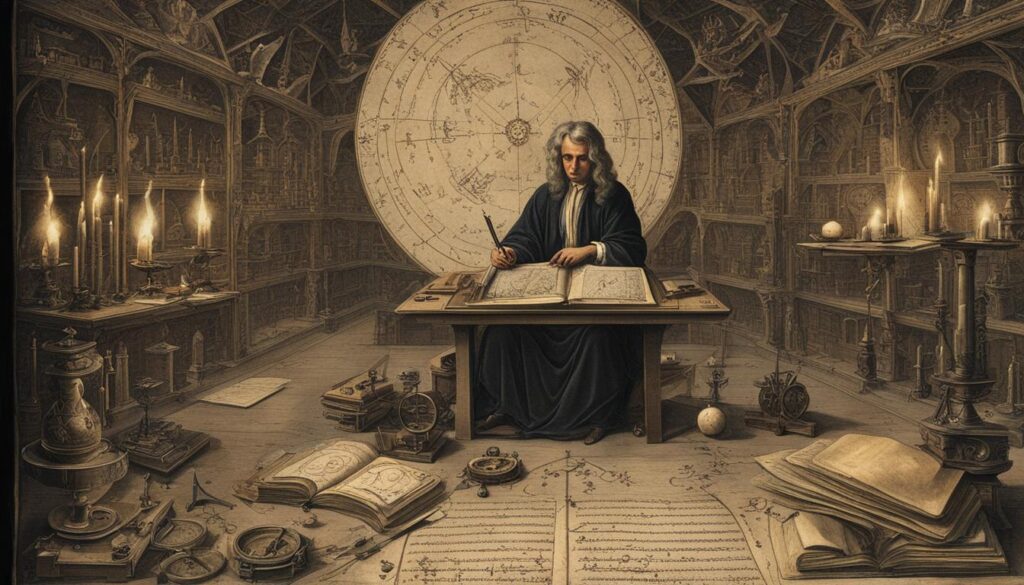
Carl Linnaeus and the Classification of Mythical Creatures
As you delve into the studies of Carl Linnaeus, the renowned father of taxonomy, you’ll find that his legendary classifications went beyond the flora and fauna we know today. Linnaeus’s intrigue went further, touching the boundaries where astrology and science integration intersect. His scientific thinking wasn’t limited to the observable and the tangible; it entertained the astrologically influenced speculation of mythical creatures.
Imagine the time of Linnaeus, an era abundant with curiosity and the thirst for discovery. Scientific inquiry was in many ways a mystical journey, one where astrology and scientific thinking were often intertwined. In his works, Linnaeus foresaw the potential for cryptids to exist within the realms of scientific classification. His systematic approach to the natural world allowed for an openness to the celestial-a reflection of the age’s philosophical and existential curiosity.
- The Hamburg Hydra: Linnaeus debunked this myth with scientific rationale, showing a commitment to empirical evidence while keeping an open mind to astrological correlations.
- Quest for Cryptids: Linnaeus never shut the door on the possibility of discovering new, fantastical creatures that might bridge the gap between science and mythology.
- Integration of Disciplines: His openness illustrated a harmonious period where the lines between astrology and scientific analysis were beautifully blurred, yet, respectful of each field’s methodologies.
This historical perspective reminds us that the pursuit of knowledge often requires embracing uncharted territories. As we reflect on the integration of astrology and science, Linnaeus’s legacy offers an inspiring view of a time when scientific thinking harmonized with the celestial dance of possibility.
Alchemy and Magic: Scientists’ Fascination with the Occult
When you delve into the annals of history, you find a surprising alliance between the empirical quests of science and the enigmatic allure of the occult. The line between astrology and scientific research has always been intriguingly malleable, especially during the times when legendary thinkers like Paracelsus and Robert Boyle made their mark. These eminent figures embodied the remarkable blend of intellectual curiosity and a profound attraction to mystical pursuits that characterized much of pre-modern scientific thought.
The Magical Beliefs of Paracelsus
Paracelsus, a name synonymous with advances in toxicology and medical mineral use, wasn’t just about the corporeal. His dedicated belief in what was termed “natural magic” illustrates the intertwined paths of rigorous scientific inquiry and the quest for arcane knowledge. To understand how astrology and scientific credibility could coexist, consider Paracelsus’s endeavors as he attempted to unlock the veiled secrets of the world around us, suggesting that the known and the unknown were pieces of the same puzzle waiting to be solved.
Robert Boyle’s Defense of Alchemy
Robert Boyle stands as a towering figure in chemistry, yet his fascination with alchemy speaks to a more complex portrait of a man torn between two worlds. His defense of the alchemical arts and the push for their legalization reflect the persistence of the esoteric’s charm over even the most scientifically grounded minds. This duality—a testament to the broader astrology acceptance among scientists of the period—captures the enduring dialogue between scientific exploration and the magnetic pull of the mystical enigmas of alchemy.
Alchemy and Magic: Scientists’ Fascination with the Occult
Did any renowned scientists actually believe in astrology?
Yes, some of history’s most renowned scientists also held beliefs in astrology. Figures such as Galileo Galilei, Johannes Kepler, Tycho Brahe, Isaac Newton, and others integrated astrological beliefs in their scientific work, reflecting the historical intersection of astrology acceptance among scientists and astrological beliefs in science.
How did astrological beliefs influence the scientific thinking of Galileo?
Galileo Galilei was both a revolutionary astronomer and a practicing astrologer. He constructed natal charts for the elite and taught astrological principles to medical students, showcasing a time when astrology and scientific thinking were more integrated, and there was less segregation between disciplines.
Was astrology a part of Galileo’s teachings?
Absolutely! In addition to his astronomical discoveries, Galileo taught astrological principles and made astrology calculations, showing integration of astrology in the scientific community of his time and a significant overlap between astrology and scientific thinking.
Did Johannes Kepler contribute to astrology?
Johannes Kepler, known for his three laws of planetary motion, worked as an astrological advisor and created horoscopes. His work stands as an example of how astrology and scientific credibility coexisted and how astrology was integrated into the work of scientific pioneers.
How did Tycho Brahe view astrology?
Tycho Brahe was both an accomplished astronomer and a staunch defender of astrology. He engaged actively in alchemical and astrological studies and criticized those who dismissed astrology’s validity, contributing to astrology in the scientific community of that era.
Did Isaac Newton really practice alchemy?
Yes, Isaac Newton spent a significant portion of his life studying alchemy. His search for the philosopher’s stone mirrored the interests of many scientists in that period, who found their scientific credibility bolstered by their esoteric pursuits.
What was the importance of the philosopher’s stone to scientists like Newton?
The philosopher’s stone was a legendary substance that could supposedly transform base metals into gold and grant immortality. Scientists like Newton were deeply fascinated by its potential, which reflects the persistent intrigue in alchemy and astrology among even the most empirical scientific minds.
Did Carl Linnaeus ever categorize mythical creatures scientifically?
While Carl Linnaeus is known for his systematic classification of the natural world, he did entertain the existence of mythical creatures and included some in his early works. His open-minded approach exemplifies the era’s blend of scientific inquiry and astrological thinking.
Was Paracelsus a believer in the occult?
Indeed, Paracelsus, a father of toxicology, was also deeply entrenched in the world of “natural magic.” His insistence on the harmony between nature and the celestial firmly wedded his scientific pursuits with esoteric ones, paving the way for astrology and scientific research to be discussed in conjunction.
What was Robert Boyle’s position on alchemy in the context of science?
Robert Boyle, often called the father of modern chemistry, actively defended and practiced alchemy. He lobbied for its legitimacy, signifying the astrology and scientific research were sometimes intertwined in their quest for understanding the natural world.

